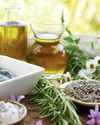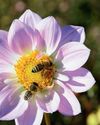Prøve GULL - Gratis
The bottom line
WellBeing
|Issue 213
During the Couid pandemic, we were shocked to see people fighting in supermarkets over toilet paper and to see empty shelves that had once held roll after roll. The reasons behind the run for toilet paper during this time reflect the unique place that it holds in our psyche and are deeply rooted in our history.

T he societal reverberations of the pandemic were as eerie as they were unexpected. One of the vivid Covid moments that etched itself into my memory came one day when a local music teacher confided to me through a bright blue face mask and behind the back of a conspiratorially raised hand that, "There is going to be a delivery today. Getting there about 11am." Music teachers are not usually clandestine plotters, but the pandemic had made conspirators of us all. He was telling me that the local independent supermarket would be getting a delivery of the commodity that had become like sugar during World War II, something that was rationed due to its rarity: toilet paper. I felt like a Cornish smuggler being told to meet a brigantine at midnight. Sadly, the music teacher's intelligence proved to be faulty, and no toilet paper consignment floated ashore. The whole toilet paper imbroglio during Covid was tragic, yet vaguely comic at the same time, and it raised questions as to what toilet paper means to us and how have we come to use paper to wipe ourselves in the first place.
A human foible
The first thing to acknowledge about the use of toilet paper is that it is a distinctly human thing. An important part of our evolutionary progress was the decision to walk upright. Being able to walk with hands free offered humans advantages, but everything comes at a price. One of the costs of erect posture is that the area used to release faeces is compressed between thighs and fleshy, muscular buttocks meaning that we are more likely than other creatures to foul ourselves when we defecate. Hence, we have come up with the idea of toilet paper but not before a lot of trial and error and, importantly, not universally.
Sticks and sponges, pottery and paper
Cleaning of the bottom can be carried out in numerous ways that have varied according to local customs and climate throughout history.
Denne historien er fra Issue 213-utgaven av WellBeing.
Abonner på Magzter GOLD for å få tilgang til tusenvis av kuraterte premiumhistorier og over 9000 magasiner og aviser.
Allerede abonnent? Logg på
FLERE HISTORIER FRA WellBeing

WellBeing
WE'RE ALL in it together
Primates share food. Pandas share bamboo. Yet humans have engineered loneliness into an art form. While our screens glow with artificial connection, a quiet crisis unfolds as younger generations feel more isolated than ever before. But watch closely as communities prove that perhaps we haven't completely forgotten how to be tribal after all.
7 mins
Issue 216

WellBeing
The power of accreditation in natural medicine
The support and interest in natural medicine is growing with more people turning to complementary therapies to boost their health and wellbeing.
2 mins
Issue 216

WellBeing
Breaking free of comparison
Every time you catch yourself thinking, “They’re doing it better,’ your inner child remembers being told to be more like someone else. But what if this instinct to compare isn’t natural at all — rather, it’s a carefully constructed habit with roots in your earliest memories? Unpacking this inheritance might just be the key to reclaiming your sense of worth.
3 mins
Issue 216

WellBeing
THE GUT SKIN CONNECTION
The science of skin health is shifting – expanding beyond the epidermis and into the microbial metropolis of the gut. Clear skin may depend less on what you see in the mirror and more on a hidden ecosystem within.
7 mins
Issue 216

WellBeing
A culinary cuddle
Imagine a treat that's not just a delicacy but a delightful narrative of nourishment, wrapped in creamy white chocolate and sprinkled with nature's most charming ingredients.
2 mins
Issue 216

WellBeing
GOING OFF-GRID
Many fantasise about severing their financial dependence on big companies for everyday needs like power and water. Others make it a reality. What can we learn from them?
7 mins
Issue 216

WellBeing
Untamed BALI
For many Australians, Bali has become synonymous with crowded streets and mass tourism. Yet vast swathes of the island remain wonderfully wild. The western coast, with waves for all levels and authentic village life, tells a different story of Bali.
6 mins
Issue 216

WellBeing
Stop and smell the roses
What's in a name?” Shakespeare's Juliet famously pondered. For MV Skintherapy, it's everything, which is why they've deliberately used the term “skin therapy”, instead of “skincare”.
3 mins
Issue 216

WellBeing
Siberian ginseng (Eleutherococcus senticosus)
(Eleutherococcus senticosus)
3 mins
Issue 216

WellBeing
Green Beat
A new study published in Science highlights the alarming risks pesticides pose to ground-nesting bees, vital for pollination and food production.
2 mins
Issue 216
